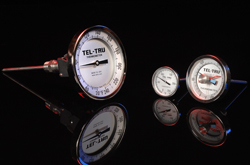
Asphalt Plant
Tel-Tru is your reliable temperature testing and monitoring equipment supplier. We can help your plant safely team produce the highest quality mixes, and help to avoid temperature measurement errors.
Before and during asphalt production, laboratory testing must be done. The optimal composition, the mix volumetrics, and the aggregate gradation of the asphalt are all developed in the laboratory, together with the air and mineral aggregate voids.
Constant testing of HMA and WMA is important to ensure the highest quality and the appropriate composition of the mix. Test batches should be pulled regularly from the production process for testing in accordance with the customer's specifications, and of course state guidelines. Results are then readily available for pre-approval and follow-up audits.
See below for recommended products and additional information on asphalt plant temperature monitoring.
Please refer to your local and state guidelines to ensure all quality and safety regulations are met.
| Thermometers for Laboratory and Production Plant | View specs and purchase | ||
|---|---|---|---|
| Laboratory Testing and General Purpose Bimetal Thermometers | |||
-50/500°F |
GT100 8" stem, 50/500°F with sheath | 15100864AAEAFAA | $42.49 |
| GT100R 8" stem, 50/500°F with sheath and calibration feature | 16100864AFEAFAA | $42.49 | |
| If you don't see what you're looking for, click here to configure other options. | |||
Digi-Tel Direct Mount Thermometers |
|||
-75/750°F |
ND5 Back Connect, 4" Probe, -75/750°F | ND5BB09211P22046 | $529.01 |
| ND5 Bottom Connect, 4" Probe, -75/750°F | ND5CB09211P22046 | $529.01 | |
| ND5 Adjustable Angle, 4" Probe, -75/750°F | ND5AB09211P22046 | $529.01 | |
| If you don't see what you're looking for, click here to configure other options. | |||
Digi-Tel Remote Mount Thermometer |
|||
-75/750°F |
ND4 Remote Mount 4" Probe, 5' cable -70/750°F |
ND4RB09215P22042-C1005 | $529.01 |
| If you don't see what you're looking for, click here to configure other options. | |||
RTD Assemblies |
|||
-60/500°F or 0/500°F |
NPAA3 .250" probe 2-1/2" probe length 1/2" NPT Connection with 6" leads, -60/500°F, no transmitter included | NPAA3202A101-C0600 | $108.52 |
|
NPAA3 .250" probe 2-1/2" probe length, ½" NPT connection with cast aluminum connection head, 0/500°F, 3-wire Temperature Transmitter, PC-programmable for PT100 Input |
NPAA3202A158-D03C1 |
$205.48 |
|
| If you don't see what you're looking for, click here to configure other options. | |||
When temperatures are too high or too low
| Consequences: | Potential Costs: |
|---|---|
|
|
Quality
Asphalt mixing plants heat aggregates and mixes them with bitumen and other adhesive substances to generate Hot Mix Asphalt (HMA).- Quality of the specific product is highly dependent on keeping the mix at its desired temperature
- Quantity and nature of the aggregate are dependent on specific requirements determined by the contractor, and can vary by the application.
- If temperatures are out of normal range, or higher than normal, the mix will destroy the bituminous binders, making the mix too viscus and will impact the durability of the pavement.
Safety
Combustion of material is the biggest safety risk at the plant on a day-to-day basis. Most at risk are the bag houses, mixing drums, and enclosed elevators. Monitoring temperatures with reliable instruments can be vital for maintaining a safe environment.
- Flashpoint of hot tar is 450°F
- Follow NFPA 30- Flammable and Combustible Liquids Code
Efficiency
Logging and analyzing historic temperature data from the point of discharge at the plant to the point of placement at the construction site is useful for optimizing the paving process. In order to provide an HMA product with the greatest potential for success, the discharge temperature needs to be closely monitored and controlled on a continuous basis.
- Inconsistency in production will cause issues with loading trucks on schedule and holding up projects, potentially leaving customers stuck and missing their deadlines.
- Optimizing the process based on a greater number of accurate temperature data points will provide opportunities for improvements in efficiency.
Summary of Important Temperature Ranges
Several factors that affect controlling temperature in the production of the HMA are discharge temperature, ambient temperature, moisture content, and the specific type of HMA which is being produced. Discharge temperature refers to the measurement of the amount of heat loss from the material as it flows though the stages of production within the plant, all the way through to loading it into trucks, and continuing through the transportation process.
- Typical temperature range during production of HMA is between 260°F to 330°F to ensure the highest quality product. This varies by the exact type of mix that is required.
- HMA should arrive at the site, ready to be offloaded into the paver at temperatures between 275°F and 300°F to ensure a smooth paving process.
- HMA should be offloaded into the paving machine as soon as possible in order to allow the final placement to be compacted to its maximum potential
| RETURN TO ASPHALT PAVING OVERVIEW | |
| Asphalt Plant | Quality Check |
| Transportation | Replacement Thermometers |
| Paving, Sealing, and Repairs | OEM Equipment |


